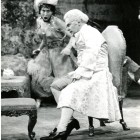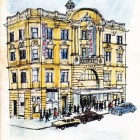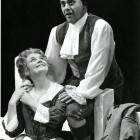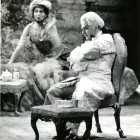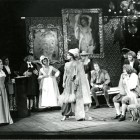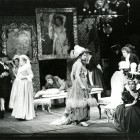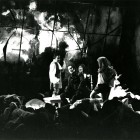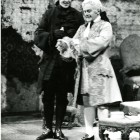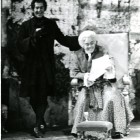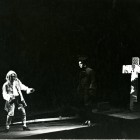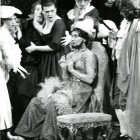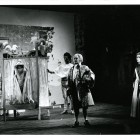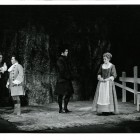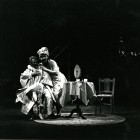Rake's Progress 1967Scottish Opera
Read more about the opera Rake's Progress
For the 1967 Edinburgh Festival, the chosen musical theme was Igor Stravinsky. A wide-ranging programme of events was produced, with the composer in attendance. Participants included the Cleveland Orchestra under their conductor, the legendary George Szell, who had been chief conductor of the Scottish Orchestra back in the thirties. The operatic programme featured the Festival debut of Scottish Opera with The Rake's Progress, and they also put on The Soldier's Tale.
Peter Diamand also continued the link with his previous employers, the Holland Festival, for a third year, by mounting co-productions of two rarities by Bellini (Capuleti) and Haydn (Anima del filosofo, under the title Orfeo ed Euridice). The Bellini cast included debuts by Anna Moffo, Giacomo Aragall and Luciano Pavarotti with Claudio Abbado, while the Haydn had rare appearances by Joan Sutherland and Nicolai Gedda.
This was the first production of Stravinsky's satirical comedy by Scottish Opera. It was altogether seen as a great success. Peter van der Bilt and Elizabeth Robson were company regulars, while Alexander Young would now become one. The Czech mezzo Sona Cervena had been to the Festival with her home company, and would now visit Scotland frequently.
When the time came for the planned revival in 1971, it was discovered that the sets had fallen to bits, so young staff director David Pountney was invited to mount a new production, which of course had to be both quick and cheap.
Scottish Opera's Sixth Season - 1967
The spring 1967 season of Scottish Opera opened with the excellent new production of Così fan tutte, which was joined by the company's first stagings of Das Rheingold and La bohème. There were also revivals of Otello and Albert Herring.
The 1967 season of mainstage performances involved Perth (Theatre), Glasgow (King's Theatre), Aberdeen (His Majesty's Theatre), and Edinburgh (King's Theatre). For the first time the company was invited to appear at the Edinburgh Festival, with a major contribution to the Stravinsky theme.
The productions were Cosi fan tutte (9 performances), Albert Herring (4), Rheingold (5), La bohème(7), Otello (5), Rake’s Progress (4) and Soldier’s Tale (6).
The complete schedule for the season was:
Perth, w/c Mon 10 Apr: Wed 12 Cosi fan tutte; Fri 14 Albert Herring; Sat 15 Così fan tutte.
Glasgow, w/c Mon 1 May: Sat 6 Rheingold.
Glasgow, w/c Mon 8 May: Wed 10 Così fan tutte; Thu 11 La bohème; Fri 12 Rheingold; Sat 13 La bohème.
Glasgow, w/c Mon 15 May: Tue 16 Così fan tutte; Wed 17 Otello; Thu 18 m Così fan tutte; Thu 18 e La bohème; Fri 19 Albert Herring; Sat 20 Otello.
Aberdeen, w/c Mon 22 May: Tue 23 Rheingold; Wed 24 Albert Herring; Thu 25 Così fan tutte; Fri 26 Otello; Sat 27 La bohème.
Edinburgh, w/c Mon 29 May: Tue 30 Otello, Wed 31 Così fan tutte; Thu 1 Jun La bohème; Fri 2 Das Rheingold; Sat 3 Otello.
Edinburgh, w/c Mon 5 Jun: Tue 6 Albert Herring; Wed 7 Das Rheingold; Thu 8 m Così fan tutte; Thu 8 e La bohème; Fri 9 Così fan tutte; Sat 10 La bohème.
Edinburgh Festival - King's: 22, 26, 31 Aug; 8 Sep Rake’s Progress.
Edinburgh Festival - Assembly Hall: 4, 5, 6, 7, 8, 9 Sep Soldier’s Tale.
As Scottish Opera gathered strength, by its fifth year the season had therefore grown to an impressive forty performances within Scotland; three Perth; five Aberdeen; eleven Edinburgh (plus ten at the Edinburgh Festival); and eleven Glasgow.
Performance Cast
- Trulove a country squire
- Anne Trulove Trulove's daughter
- Tom Rakewell a young gentleman engaged to Anne
- Nick Shadow
- Mother Goose keeper of the brothel
- Baba the Turk a bearded lady and circus attraction
- Sellem an auctioneer
- Keeper of the Madhouse
